Flood Strikes Neglected Northern Iran, Five People Missing
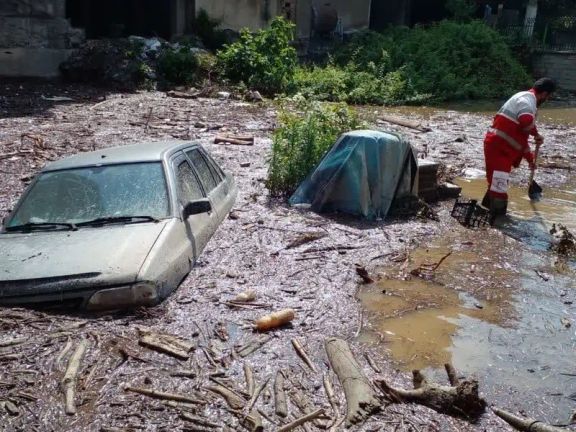
A flood has hit northern Iran on Tuesday evening, leaving five people missing and 24 injured.

A flood has hit northern Iran on Tuesday evening, leaving five people missing and 24 injured.
The flood, triggered by severe rainfall that began Tuesday afternoon, resulted in the overflow of the Telar River and subsequent flooding in the area of Savadkuh, Mazandaran province.
The event caused extensive damage to roads, infrastructure, residential homes, and farmlands in an area already suffering desperate poverty.
Gholamali Fakhari, the head of the Red Crescent Society in Mazandaran, said Wednesday afternoon that the number of people missing has increased to five.
Earlier, he had confirmed that a 15-year-old girl and a 45-year-old woman are missing and rescue operations underway in the area.
The General Directorate of Crisis Management in Mazandaran recorded between 40 to 60 millimeters of rain in less than one hour. An alert for heavy rainfall and potential flooding had been issued prior to the disaster.
The flood follows closely on the heels of severe floods earlier this month when the Red Crescent Society reported 13 provinces had been affected, including Esfahan, Tehran, Semnan, Zanjan, Qazvin, and East Azerbaijan.
In May, floods in Khorasan Razavi province resulted in at least seven deaths, and prior to that, flooding in Sistan-Baluchestan also suffered from floods that resulted in at least 18 deaths and disappearances.
Critics blame the Islamic Republic's persistent neglect of essential infrastructure, the failure to dredge rivers adequately, and the lack of a proper urban water channel system as primary contributors to the repetitive cycle of devastating floods.
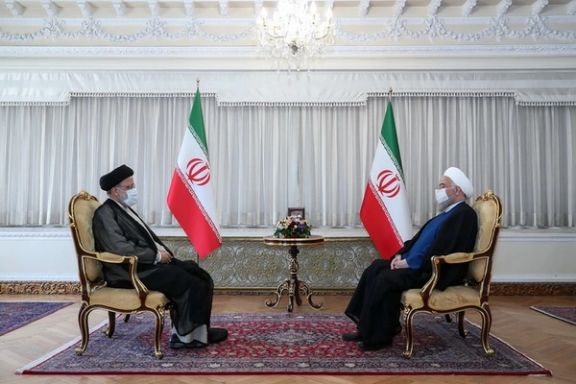
Observers note that amid otherwise uneventful presidential debates, a contentious issue emerged, dividing conservatives and so-called reformists: the unfulfilled promise of a COVID-19 vaccine.
Four of the six handpicked presidential candidates, including conservative contenders Alireza Zakani, Saeed Jalili, Mohammad Bagher Ghalibaf, and Amir-Hossein Ghazizadeh Hashemi, have accused the previous "reformist" administration of cynically using sanctions and FATF regulations to justify avoiding vaccine imports, thereby misleading the public.
Their criticisms have been primarily directed at Masoud Pezeshkian, the sole "reformist-leaning" candidate.
During the debates, presidential hopeful Ghazizadeh Hashemi remarked, "They [Hassan Rouhani's government] even received the second dose of the Pfizer vaccine themselves but prevented the ordinary people from becoming 'lab rats' for COVID-19 vaccine trials and obstructed all imports. They also cited FATF as a justification. Yet now they claim to have imported COVID-19 vaccines."
He said, "They should have imported them two weeks earlier so the current administration wouldn’t claim sole credit."
In a newly released video, former President Hassan Rouhani addressed criticism from conservatives. He said that his statement about Iranians not being "lab rats" was in response to China's proposal, not US or UK, to commence vaccine trials in July 2020 in Iran.
"At the time, the prevailing understanding was that vaccine trials require two years before they are deemed safe for public distribution, so when assurances were made that their vaccine would be ready by summer, skepticism arose regarding its adequacy," Rouhani stated.
He elaborated that he had "consulted the Health Ministry and other relevant organizations," which "opposed the trials" because "China refused to assume responsibility for any potential fatalities."
Rouhani further claimed that he never prohibited vaccine imports and had "written to the Health Ministry, instructing them to purchase vaccines from 'any country' that developed a safe and effective vaccine."
"We also began using Russia's Sputnik vaccine in February 2021, followed by China's Sinopharm a month later," he said.
“Our government procured and administered approximately 30 million vaccine doses, including a separate agreement with China for 60 million doses, and secured a contract with COVAX for 16.8 million doses. Additionally, we finalized an agreement with Russia for 60 million doses of the Sputnik vaccine,” Rouhani said.
"We procured the vaccine, but its distribution was attributed to the incoming government due to the logistical delays in delivery," he added.
While allegations revolve around Rouhani's handling of vaccine imports, it was the country's Supreme Leader Ali Khamenei, who in January 2020, issued an order banning the import of COVID-19 vaccines from the US and UK, urging Iran to pursue vaccine development or secure them from more reliable sources.
“If their Pfizer company can produce vaccines, why don’t they use them themselves so they don’t have so many dead? The same applies to Britain," Khamenei said at the time.
Khamenei’s conspiracy theories regarding COVID-19 had been circulating for some time, but the explicit ban on these vaccines began then.
His directive came after the Iranian Red Crescent Society (IRCS) announced on December 28, 2020, that a consortium of US-based philanthropists had pledged to donate 150,000 doses of the Pfizer/BioNTech vaccine for transfer to Iran within three weeks. An IRCS spokesperson confirmed the abandonment of the plan shortly after.
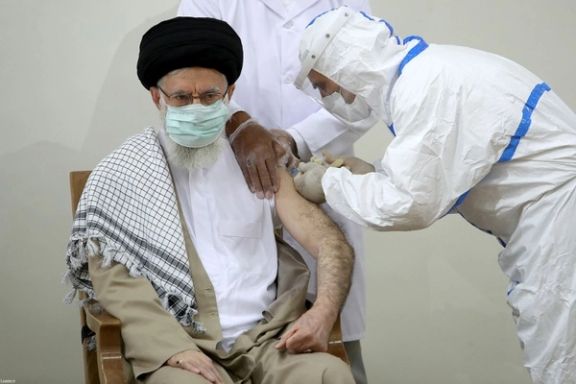
According to Rouhani, they secured permits for AstraZeneca vaccines through intermediary channels, ensuring they were not directly exported from the US or the UK.
Rouhani’s administration though, presented conflicting statements regarding procuring vaccines through "COVAX," a global initiative to ensure equitable access to COVID-19 vaccines for low-income countries, and the impact of sanctions and FATF regulations.
Abdolnasser Hemmati, the head of the Central Bank of Iran, stated that depositing foreign currency into the World Health Organization's account requires approval from the US Department of Treasury, which has posed a "hindrance" to the process. However, the Drugs Importers Union chairman, Nasser Riahi, refuted this claim, asserting that there are no obstacles to purchasing vaccines through COVAX.
Government spokesperson Ali Rabiei also stated, "Due to sanctions laws and FATF regulations, several stages of money transfers encountered difficulties and obstacles."
This is while the US has always maintained that while they impose economic sanctions to curb Iran's backing of terrorism and proxy conflicts in the Middle East, it excludes medical supplies, agricultural products, personal communication devices, and humanitarian aid destined for the Iranian populace from these sanctions.
In August 2021, shortly after Ebrahim Raisi assumed office, Khamenei shifted his stance, emphasizing that COVID-19 had become the nation's foremost priority. He underscored the imperative to secure vaccines through all available means.
"Whether through importation or domestic production, vaccines should be diligently provided and made accessible to all individuals through every feasible means," Khamenei said in August 2021.
This move allowed conservatives to claim credit for the subsequent mass vaccination campaign.
The vaccination campaign saw a significant uptick under Ebrahim Raisi's conservative administration following Rouhani's tenure, coinciding with Iran's "summer of death" in 2021, with the highest daily death toll and new cases of COVID-19 in Iran.
In 2023, medical experts reported over 75,000 preventable COVID-19 deaths in Iran, attributing them to Khamenei's reluctance to permit global vaccine access.
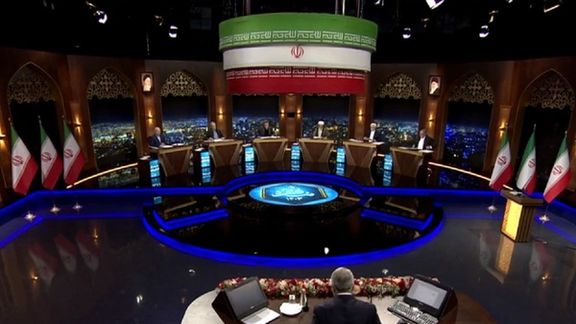
During the final presidential election debate on Tuesday, candidates in Iran's presidential election focused their talking points on the country's internet shutdowns amid past popular protests.
The state-led internet shutdowns amid the violent crackdown on the November 2019 protests became a heated topic of discussion between conservative Amir-Hossein Ghazizadeh Hashemi and so-called reformist Masoud Pezeshkian.
Known as Bloody November, the protests were initially triggered by an increase in fuel prices but quickly evolved into calls for the overthrow of the state and Supreme Leader Ali Khamenei.
It has been noted as one of the most significant civil uprisings since the Islamic Revolution in 1979. Reuters reported that at least 1,500 protesters were killed in the state's crackdown on dissent, while other reports have suggested that at least 3,000 were killed, with tens of thousands detained.
In the fifth presidential election debate on Tuesday, hardliner Ghazizadeh Hashemi claimed that a deputy head of Masoud Pezeshkian’s campaign was the “commander of the internet shutdown operation” during the November 2019 protests.
Ghazizadeh Hashemi was referring to Mohammad-Javad Azari-Jahromi, who served as the Minister of Communications in Hassan Rouhani's government during the three-day internet blackout.
He labeled Jahromi as the "main agent of filtering" and the "commander of the internet shutdown" stating, "The largest slaughter of the internet is recorded in the name of Rouhani's administration."
Azari-Jahromi responded to the allegations which were echoed in previous debates, in a tweet, stating: “Mr. Ghazizadeh, the order to cut off the internet in 2019 was approved by the candidate who was sitting next to you in the debate. Why are you misrepresenting the facts?”
Jahromi was referring to Saeed Jalili, one of the ultra-conservative candidates in this presidential election.
In response to Ghazizadeh’s attacks, Pezeshkian mentioned that in a phone call, Jahromi emphasized that during his tenure as minister, Saeed Jalili and Mohammad Bagher Ghalibaf were part of the Supreme National Security Council (SNSC) and the order to cut the internet came from there.
Pezeshkian added that Jahromi was taken to court for attempting to resist the decision to cut off the internet in November 2019.
After the debate, Jahromi corrected Pezeshkian in a tweet, stating that Ghalibaf was not a member of the SNSC at that time.
The overall issue of internet filtering and shutdowns was also discussed by other candidates in the debate.
In addition to internet shutdowns, Iran's fixed broadband internet speed for the general public is among the slowest in the world, ranking 156th out of 181 countries according to the Speedtest Global Index.
Alireza Zakani, another conservative hopeful, mentioned "protecting freedom, security, and privacy" of citizens alongside creating opportunities for "internet access and employment" as goals of his administration.
Jalili supported domestic messaging apps and the national internet, which restricts access to foreign websites.
Pezeshkian also defended the government's "intervention" in people's internet access and cutting it off during times of crisis in the country.
Under the leadership of Isa Zarepour, Minister of Communications in Raisi's administration, internet accessibility has not only stagnated but has also become more restricted.
The government has intensified its censorship efforts, routinely blocking access to popular platforms such as WhatsApp and Instagram, and deliberately disrupting service.
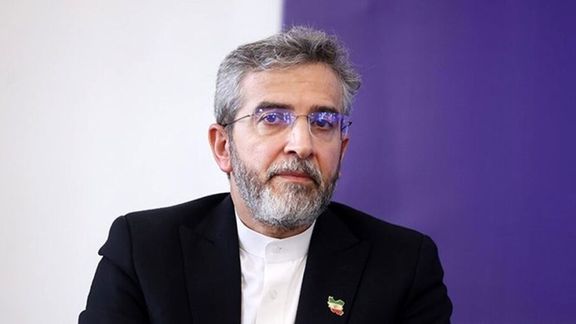
Iran's Acting Foreign Minister claims the country has followed the right path in nuclear negotiations and is in an excellent position, in spite of it being under global sanctions for its nuclear program.
Ali Bagheri Kani, one of Iran's top nuclear negotiators, said the incoming president to be elected in Friday's elections, "can move forward on this smooth path" with "fresh energy".
During a press briefing on Wednesday, Bagheri discussed the sanctions relief negotiations under former president Ebrahim Raisi, killed in a freak helicopter crash last month.
However, he failed to add that during Raisi's tenure in office since 2021, a series of crises occurred. Iran banned multiple UN inspectors and exceeded uranium enrichment levels beyond UN restrictions and the UN's nuclear chief said in April that Iran was in fact "weeks not months" from a nuclear weapon.
Bagheri's statements contrast starkly with the current reality of the failed nuclear talks. Earlier this month, the UN nuclear watchdog's Board of Governors passed a resolution censuring Iran and demanding that it resolve outstanding issues with the IAEA over its advancing nuclear program.
The development follows a history of UN Security Council sanctions targeting Iran's nuclear ambitions since 2006. While many economic sanctions were suspended in 2015 as part of the Joint Comprehensive Plan of Action (JCPOA), the US withdrew from the deal in 2018 and reimposed nuclear-related sanctions on Iran.
The latest confidential IAEA report reveals that Tehran has increased its enriched uranium stockpile to over 142 kilograms at 60% enrichment, a 20-kilogram rise since the last report in February.
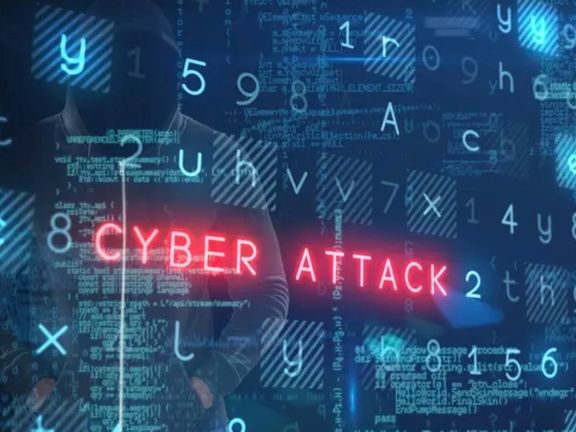
Israel’s National Cyber Directorate says Iran poses a significant cyber threat worldwide, escalating attacks at three times the rate since Hamas’s October 7 massacre.
The attack by the Iran-backed group saw around 1,200 mostly civilians murdered and over 250 taken hostage.
Gaby Portnoy said on Tuesday that the cyber attacks by Iran targeted a wide array of nations, including the United States, Canada, Saudi Arabia, Oman, the United Arab Emirates, India, the United Kingdom, Germany, Australia, and Austria.
Speaking at the annual Cyber Week conference at Tel Aviv University, Portnoy revealed that Iran also targets its allies.
“We have identified that Iran is attacking its allies and other countries for information extortion and damaging digital services. The information stolen from government systems is then used for Iranian cyber-terrorism,” he stated, Iran violating international law and endangering civilians in the process.
Portnoy named several Iranian-linked hacking groups, such as Homeland Justice, based in Albania, and Imperial Kitten, operated by the Islamic Revolutionary Guard Corps.
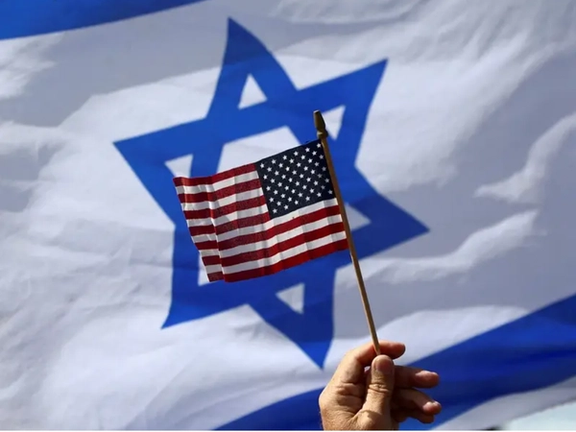
Israel and the US are set to reconvene a joint meeting on Iran next month, mere days after the White House canceled it, according to Axios, citing five officials from both nations.
The meeting, originally scheduled for last Thursday, was reportedly canceled in response to a video by Prime Minister Benjamin Netanyahu, accusing the Biden administration of withholding military aid amid the Israel-Hamas war.
Senior Israeli and US officials, as reported by Axios, say that although a date for the new meeting has not been set, it is expected to occur in mid-July, before Netanyahu’s scheduled address to the US Congress on July 24.
A senior Israeli delegation headed by national security advisor Tzachi Hanegbi and Minister Ron Dermer will travel to Washington for the talks, according to the same report. Talks are likely to focus on concerns in Israel, over advancements in Iran's nuclear program, with fears that they could be tied to potential weaponization efforts.
The US-Israel strategic consultative group (SCG), the forum for the two countries to discuss the state of the Iranian nuclear program, has not convened since March 2023.
US and Israeli officials say that the Iranian nuclear program has significantly escalated since then, according to Axios. This month, G7 leaders urged Tehran to cease and reverse its nuclear escalations and stop its enrichment of uranium that they said have no credible justifications, according to a draft communique seen by Reuters.
Tehran has consistently asserted that its nuclear program is peaceful.
US-Israel Tensions Amid Fears of All-Out War with Hezbollah
Jerusalem’s latest tensions with Washington come as there are mounting fears of an all-out Israel-Hezbollah war.
In parallel with the ongoing war in Gaza, the heavily armed, Iran-backed Hezbollah group has been exchanging fire with Israel for over eight months.
In recent weeks, intensified shelling on Israel's northern border has led to the evacuation of tens of thousands from both sides of the frontier.
Defense Secretary Lloyd Austin stated on Tuesday that the US is urgently working towards a diplomatic agreement to allow Israeli and Lebanese civilians to return to their homes on both sides of the border.
Both Israeli and US officials say they are hoping to resolve the conflict with Hezbollah, preferring a diplomatic solution.
This week, Netanyahu announced that the "intense phase" of fighting Hamas in Gaza is nearing its end, allowing Israeli forces to shift their focus to confronting Hezbollah along the northern border with Lebanon.